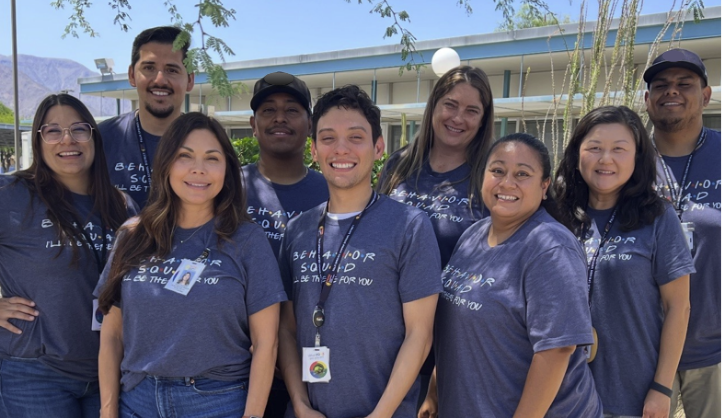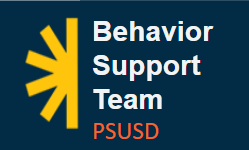Behavior Support Team


BST Links
-
Palm Springs Unified School District's Behavior Support Team is comprised of a Board Certified Behavior Analyst, Behavior Interventionist, a School Social Worker, Teacher on Special Assignment and three Paraprofessionals.
California voters passed Proposition 47, the Safe Neighborhoods and Schools Act (SNSA), in November 2014. Subsequent legislation in 2016 established the Learning Communities for School Success Program (LCSSP).
-
The LCSSP was established for the purpose of implementing the K-12 education portion of the SNSA. Through this program, the Department will administer grants and coordinate assistance to local educational agencies (LEAs) to support their efforts in identifying and implementing evidence-based, nonpunitive programs and practices aligned with the goals for pupils contained in each of their local control and accountability plans (LCAP), pursuant to Education Code (EC) Section 47606.5, 52060, or 52066, as applicable.
Team Members
BST Directory
| Showing results for "Professor named Smith at Elementary School" |

- Sandy Adolph

- Rose Davila
- Jesus German

- Tammy Heo
- Sarah Martin

- Eric Martinez

- Vinny Mejorado III
- Ozzy Perez

- Patricia Rodriguez

- Alexis Valenzuela
Purpose
-
The goals of the LCSSP are to support evidence-based, non-punitive programs and practices to keep the state’s most vulnerable pupils in school. These programs and practices must complement and enhance the actions and services identified to meet the LEA’s goals per the LEA’s LCAP.”
There have been a number of recent changes in and around PSUSD. In the past year, the district’s “high risk” student count has increased from 89% to 97%.
Local Control and Accountability Plan (LCAP) goals and strategies
Palm Springs Unified School District commits to four LCAP goals. The following two goals are identified as priority goals for the purposes of the LCSSP grant, addressing truancy while supporting students at risk of dropping out of school or who are victims of crime.
LCAP Goal 2: Parent and Community Partnerships
Palm Springs Unified School District will collaborate with families and our local communities to ensure all students are actively engaged in learning and connected in meaningful ways to their school community.
Strategies for addressing this goal will include increasing parent connection through outreach and offering of resources. Resources include sharing upcoming district events, training and discussion that is relevant for families of high-risk students, and individualized check-ins or home visits as needed. Positive interventions and supports that align with school practices will be shared with families to encourage generalization to the home setting. Efforts will combine to increase communication between families and the school community, in turn, improving behavior and attendance, reducing suspensions, and improving access to instruction.
LCAP Goal 3: Safe and Secure Environment
Palm Springs Unified School District will provide students with a clean, healthy, physically and emotionally safe learning environment.
Strategies for addressing this goal will include the Behavior Support Team’s (BST) utilization of a multi-tiered system of supports (MTSS) that ranges from district-wide to individual student implementation. Within a tiered system, the BST will implement Positive Behavioral Interventions and Supports (PBIS), Restorative Practices (RP), and Social Emotional Learning (SEL) across tiers 1, 2, and 3. Tier 3 supports will offer the highest-needs students access to individual behavioral support and mental health support that aligns with behavioral needs. Efforts will improve student access to academics by improving school climate, decreasing suspensions and absenteeism, increasing general engagement, increasing physical and emotional safety, and strengthening students’ interpersonal and problem-solving skills.
School climate reflects the students’ experience at school, and will result in more positive outcomes, overall. Consistent, district-wide implementation of a Multi-tiered System of Supports (MTSS) creates a positive environment and school climate for all students, one where expectations are objective and predictable. Positive school climate is one of the best indicators of outcomes such as “increased academic achievement, increased teacher retention, and reduced discipline referrals.” (PBIS.org)
The interventions and supports of MTSS help students build relationships, which is a key factor in student success. Additionally, a supportive school environment allows each student to work through unique challenges and catch up with peers who might not have the same challenges. MTSS defines tiers of intervention for both academic and behavioral challenges, school-wide and individually.
Schoolwide expectations, tiered systems of support, and consistent data analysis are hallmarks of PBIS, and are critical to its success. Implementing this framework helps to focus educators and students on positive interactions and student achievement rather than on student failures and punishment.

